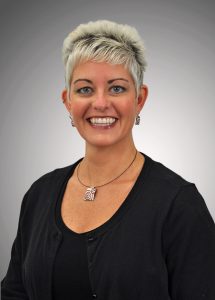Elizabeth Giuliano, a professor of ophthalmology at MU’s College of Veterinary Medicine, was selected as Small Animal Continuing Educator of the Year by attendees at the 90th annual conference of the Western Veterinary Conference (WVC), held in March at Mandalay Bay Resort and Casino in Las Vegas.
Nearly 14,000 veterinary professionals — including 5,424 veterinarians — journeyed from all 50 states and 27 countries to Las Vegas for the conference, which offers 1,000 hours of continuing education opportunities over five days. Las Vegas has been the home of the WVC’s conference since 1963.
When the labs, workshops and development sessions were complete, the conference participants voted for the conference presenters whom they felt were superior in their ability to deliver information with insight, accuracy, depth, and openness. After the votes are tallied, the WVC recognized “those who have impacted WVC’s educational program” in each of eight specialties.
“It’s a real honor to be acknowledged and appreciated,” Giuliano said. “I love being a medical educator and being an ambassador for MU’s College of Veterinary Medicine and for my specialty organization, the American College of Veterinary Ophthalmologists.
“Lecturing is something that I really enjoy,” Giuliano said. “You have a chance to maybe break through and make a difference. I try hard to create lectures that have immediate, take-home applicability; people seem to gravitate toward that.”
Giuliano, DVM, MS, DACVO, says the inspiration for her next lecture may come from an audience question-and-answer session after a current lecture.
“I can remember one year, I was lecturing at a meeting out on the West Coast and had given an hour on uveitis and an hour on glaucoma,” Giuliano continued. “In a summary slide I made the comment that you have to be concerned about what drugs are contraindicated in one or the other diseases. There were probably 500 people there, and a gentleman stood up at the very back of the lecture hall, and said, ‘You just made me a little nervous. I never thought about having to manage both of these diseases concurrently.’
“On the flight home, I was already writing my next lecture on uveitis and glaucoma and co-managing those diseases,” Giuliano recalled.
Since joining the CVM faculty in 2002, Giuliano has become an in-demand speaker, both nationally and internationally.
“I’ve been blessed to have lectured in many different countries in the past 15 years,” Giuliano said. “In recent years, I’ve been invited to speak in Indonesia, I’ve been to Thailand for the World Veterinary Conference, and to the Nordic Eye Meeting, first in Helsinki, then last year in Copenhagen.
“When you talk about international lecturing, sometimes you are speaking to audience members who don’t have the opportunity to refer,” Giuliano said. “In this country, we have the good fortune to have specialists in orthopedic surgery, in small animal internal medicine, in emergency and critical care, neurologists, cardiologists, ophthalmologists. In many countries, those specialties do not even exist. It’s so inspiring to work with general practitioners who are doing everything possible to better their skill sets without having the opportunity of having formal residency programs they can even apply to. These are incredibly motivated individuals who are ‘it’ in their home areas; it’s them or no one.”
Situations like these strike a chord with Giuliano, the daughter of a foreign-service officer, who grew up traveling and living overseas.
“It reminds me of growing up in Africa, where we didn’t have many luxuries,” Giuliano said. “There were times I had to study, literally, by candlelight. The electricity would occasionally go off for a week at a time. But, my parents taught me the value of education and the importance of a really strong work ethic.”
Giuliano’s award is significant because the WVC is serious about continuing education. The organization has been dedicated to providing comprehensive, progressive and practical continuing education to veterinary professionals since its founding as the Intermountain Livestock Sanitary Association in 1928.




